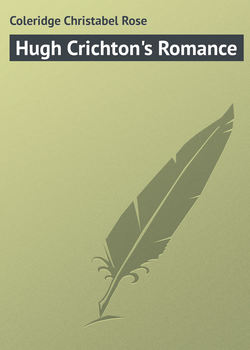Читать книгу Hugh Crichton's Romance - Coleridge Christabel Rose - Страница 14
Part 2, Chapter XIV
Left to Herself
Оглавление“As we have met, we shall not meet again
For ever, child, for ever!”
Left to herself! In the early morning Violante’s senses awoke from the confusion of disturbed and dreamy sleep; and, with burning eyes and throbbing temples, she sat upright and tried to think “for herself.”
“He will come and persuade father.” She repeated this watchword over and over again to herself; but the new confidence could hardly combat the old experience, and she could not realise that “father” would be over-persuaded – even by her lover. Childish as Violante was she had grown up too much in the constant discussion of ways and means not to be quite aware of the worldly advantages of Signor Vasari’s offer. Those attaching to Hugh Crichton’s were like a dim and distant dream, scarcely to be realised; nor had she, in the abstract, any sense that she would be unfairly treated by being deprived of her right of choice. Perhaps no creature ever entered on a conflict with less hope of success. She felt so sure that neither prayers nor tears would move her father that she never thought of trying their effect; while Signor Vasari seemed still more inexorable. If Hugh did not somehow set it right for her what remained but submission? “I had rather die; but I shall be so frightened, I shall say yes,” she thought. “They have always made me do what they wish. I could not help it! There’s no one to help me – no one!” Her cowardice and weakness had been so often cast in the poor child’s teeth that she had lost every scrap of confidence in her own powers. Her father said, “You shall give in,” Rosa said, “You cannot hold out;” and Violante knew nothing of a Strength not her own, of a Hand that would hold hers more firmly than sister’s or lover’s. Her love was the strongest thing about her: would it hold her up? She thought with a kind of ardour of resisting and refusing, of holding out and dying rather than yielding. But all the time she knew that she should yield; that she could not act and sing between the two fires of father and suitor; that the long days of conflict would not kill her all at once, but would each one be very miserable and hard to endure, and would each one wear out a little of her strength. For Violante had some experience of troublous times, and knew very well what it meant to be unhappy and in disgrace.
“He will come; he will help me.” She pushed aside the thought of what was to follow and resolved to please her father as much as possible, in the hope of protracting matters till Hugh should have time to interfere. So, to Rosa’s surprise, she appeared in a clean muslin dress and a pink ribbon and sat down to sing her scales, instead of lying in bed and crying, as inclination would have prompted. Nay, she carried her father his cup of chocolate, and kept her hand from trembling as he took it from her. Signor Mattei viewed all this as betokening intended submission: Rosa was puzzled. For the first time she could not understand Violante.
The morning hours wore away; there was, fortunately, no rehearsal. Violante sat in the window with some knitting in her lap. She did not say one word to Rosa of her fears or her intentions. Steps came up the stairs and across the corridor, and Signor Mattei ushered in the great Vasari himself. Rosa started up and came forward to receive him. Violante shrank into her corner; she grew white and cold, but she set her mouth, and under her long eyelashes her eyes looked hard and strange.
“Signor,” said Signor Mattei, “here is my daughter. I give her to you with profound pleasure, and assure you that she is sensible of the honour of your choice.”
Violante spoke not a word. She rose up, obedient to her father’s eye, and, perhaps, somewhat urged by the long habit of obedience to the manager. She dared not utter the refusal on her lips. What would they do to her; what would they say? It was better to submit – to submit till he came. Signor Vasari took her by the hand, bowed profoundly, and offered to her a handsome diamond cross and chain of pearls.
“Permit me, Signorina; they were the jewels of a princess.”
He fastened it on her neck, and then, putting his arm around her, drew her towards him as he had done before now – on the stage. Violante started and lifted her eyes. There stood Hugh Crichton within the door, his eyes fixed on her, his face as pale as hers.
“Signor Mattei, you were right, and I thank you,” he said in English, and in a hard, fierce voice. Then he turned and was gone, before anyone spoke a word.
Suddenly Violante wrenched herself out of Vasari’s grasp. She pulled the cross off her neck, scattering the pearls far and wide as she threw it on the floor.
“I hate you!” she said, “I hate you! And if you marry me I will kill you.”
“Signorina!” ejaculated the astonished manager.
“Violante, Violante!” cried Rosa.
“I hate, you!” she repeated, and then she threw herself on her knees.
“Father, father, father, kill me, kill me first.”
“Ungrateful, wicked child, you are driving a dagger into my breast!” cried Signor Mattei.
“I am deceived, I am deceived, but I will have my rival’s blood!” exclaimed Vasari.
